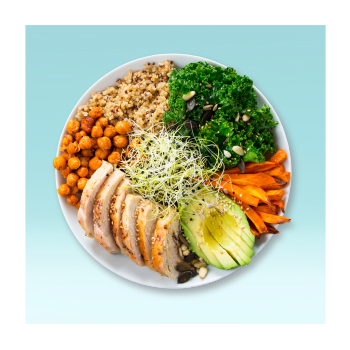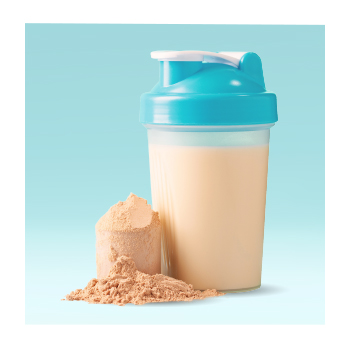


Sign-up for {N}power to get exclusive discounts, newsletters, members-only features, and more!

Staying physically active is one of the best ways we can promote health, vitality, and a long healthspan, and from yoga to weight training, distance running to walking, and everything in between, there is something for everybody. But to make physical activity an enjoyable and regular part of your lifestyle, you need to ensure you’re giving your body what it needs to perform and recover. The human body was built for regular physical movement, but regular exercise alters the body’s need for certain nutrients, specifically those that support energy production, build, repair and maintain muscle, and fight inflammation. A nutrient-dense diet and a few key dietary supplements can help fine tune your body, allowing you to perform at peak, recover rapidly, and get the most out of your workout.

Food has a significant impact on how we feel and perform during exercise, as well as how efficiently we recover afterwards. Carbohydrates and fats act as the body’s primary energy sources during exercise while protein is required for muscle growth, repair, and maintenance. During a workout, your body will use a mix of carbs and fat for energy, but depending on the type, intensity, and duration of the workout, the body will rely on one more than the other. For example, during longer low-intensity workouts, such as walking and distance running or cycling, the body will convert to burning fat, while during short sessions of high-intensity workouts, such as sprinting, interval training like HIIT, and heavy weightlifting, the body will preferentially use carbohydrates for a quick source of energy. The overall goal, though, is to become metabolically flexible, which will allow your body to efficiently switch between carb burning and fat burning as needed; this will enhance energy levels and performance, as well as overall health.
 So how do you promote metabolic flexibility? If you are already exercising regularly, you’re already on the right track, because regular exercise induces changes in the body that support improved metabolic flexibility.1 Next, take a look at your diet, because even with regular exercise, if you are not eating well, it will not only negatively impact your performance and recovery, but your overall health. Focus on whole, nutrient-dense foods including vegetables and fruit, quality protein, and healthy fats and avoid processed foods, sugar, and refined grains and vegetable oils like corn, cottonseed, and soy oils.
So how do you promote metabolic flexibility? If you are already exercising regularly, you’re already on the right track, because regular exercise induces changes in the body that support improved metabolic flexibility.1 Next, take a look at your diet, because even with regular exercise, if you are not eating well, it will not only negatively impact your performance and recovery, but your overall health. Focus on whole, nutrient-dense foods including vegetables and fruit, quality protein, and healthy fats and avoid processed foods, sugar, and refined grains and vegetable oils like corn, cottonseed, and soy oils.
When it comes to fueling up for your workout, forget the giant bowl of pasta to carb load. Instead, eat complex carbohydrates like whole grains and vegetables 24 to 36 hours prior to working out; fast digesting carbs like fruit or beetroot juice can be consumed 30 to 60 minutes before exercise for “quick” energy. It’s also important to prioritize protein, as it provides the building blocks to build and repair muscle tissue and is absolutely required to increase muscle mass. A 2022 meta-analysis of 82 studies published in the journal Sports Medicine concluded that 1.5 grams per kilogram of body weight may be the “most appropriate amount of total protein intake for maintaining and augmenting muscle strength along with resistance training.”2 For a 150-pound person, that would be about 102 grams of protein daily; however, those requirements may change depending on age (e.g., older adults require more protein) and level of exercise intensity and frequency.
 Finally, it’s important to think about hydration. Sweat contains essential minerals such as sodium, potassium, magnesium, and calcium that help regulate nerve impulses and contraction and relaxation of muscles, making it critical to replenish them. Staying hydrated with water, salt (add a half teaspoon of mineral-rich salt to your water), and electrolytes helps sustain exercise performance, support muscle relaxation, a healthy heart rate and body temperature, and can help reduce muscle cramps.
Finally, it’s important to think about hydration. Sweat contains essential minerals such as sodium, potassium, magnesium, and calcium that help regulate nerve impulses and contraction and relaxation of muscles, making it critical to replenish them. Staying hydrated with water, salt (add a half teaspoon of mineral-rich salt to your water), and electrolytes helps sustain exercise performance, support muscle relaxation, a healthy heart rate and body temperature, and can help reduce muscle cramps.
These are supplements that provide basic essential nutrients that build a healthy foundation to support regular exercise. The B vitamins create the cellular energy required for exercise, aid in repairing damaged tissue, and are required for the synthesis of red blood cells, which are necessary to carry oxygen throughout the body. In one study, a group of male athletes were depleted of the B vitamins thiamin, riboflavin, and B6 over a three-week period by eating mainly processed foods—the athletes’ exercise performance decreased significantly at the end of the three weeks.3 A quality B-complex or multivitamin will provide all of the B vitamins. Vitamin D supports increases in muscle synthesis, strength, exercise capacity, and performance and decreases muscle protein breakdown,4 while magnesium is required for energy metabolism and normal muscle function; studies have shown that magnesium needs increase as physical activity levels increase.5
These omega-3 fats found in fish oil support recovery by reducing post-exercise inflammation and oxidative damage.6 One study found that 3 grams of fish oil taken daily for one week minimized delayed onset muscle soreness after strenuous strength-training exercise in healthy men and women; participants were also able to perform more repetitions after supplementation, possibly due to increased muscle strength or decreased fatigue.7 Other research has shown that fish oil reduces heart rate and oxygen consumption during exercise (without a decrease in performance),8 reduces cortisol levels and increases lean body mass,9 and increases muscle protein synthesis in healthy individuals.10 Doses in studies range from 3 grams to 8 grams daily.
A study published in the American Journal of Physiology—Regulatory, Integrative and Comparative Physiology, found that regular consumption of 70 mL (about 1/3 cup) of beet root juice was associated with increases in blood levels of nitrates and nitrites, decreases in blood pressure, and delayed onset of fatigue in healthy men. The researchers said that the findings suggest that beet root juice can enhance physical performance by “enhancing oxygen delivery and reducing work of the heart, allowing exercise to be performed … for a longer period of time before the onset of fatigue.”11 Compounds in beets interact with stomach enzymes to produce nitrous oxide—nitrous oxide is converted into nitric oxide, which is responsible for vasodilation. Vasodilation helps improve the flexibility of blood vessels, which is suggested to help allow more blood flow to active muscle and support aerobic metabolism.12
CAAs are a group of amino acids—leucine, isoleucine, and valine—that are essential for muscle growth and repair, and while most amino acids are metabolized by the liver, BCAAs are metabolized directly by muscle tissue. Exercise, especially endurance exercise, increases the breakdown of protein and amino acids, leading to a decline in levels of BCAAs, which can result in fatigue and muscle soreness.13 14 But supplementing with BCAAs before and after exercise has been shown to decrease muscle damage and promote muscle-protein synthesis. In one study, oral supplementation of BCAAs (77mg/kg of body weight) increased BCAA levels during exercise and led to less muscle breakdown. Similar results were found in another study in which subjects consumed 3.6 grams of amino acids with 37 percent BCAAs before and after exercise. The amino acid supplement decreased muscle soreness, presumably by stimulating muscle synthesis and suppressing protein breakdown and muscle damage.15
 Whey protein is one of the best sources of BCAAs, particularly leucine, and is quickly absorbed and utilized by the muscles, giving them the food they need to stop muscle breakdown and shift to growth and repair.16 17 18 Whey protein also contains cysteine, an important building block of the body’s master antioxidant glutathione, and has been found to increase glutathione levels.19 20
Whey protein is one of the best sources of BCAAs, particularly leucine, and is quickly absorbed and utilized by the muscles, giving them the food they need to stop muscle breakdown and shift to growth and repair.16 17 18 Whey protein also contains cysteine, an important building block of the body’s master antioxidant glutathione, and has been found to increase glutathione levels.19 20
This natural compound, also called betaine or betaine anhydrous, helps your muscles function at their best, in part by acting as an osmolyte, a molecule that helps cells—including muscle cells—stay hydrated, maintaining optimal fluid balance, reducing muscle fatigue, and increasing endurance. One placebo-controlled study including 24 male subjects found that the men who consumed 1.25 grams of betaine mixed in a sports drink for two weeks were significantly able to increase the number and quality of repetitions in a squat exercise.21 And while this study found an increase in endurance and quality in a lower-body exercise, a separate study including “recreationally active men” found that 1.25 grams of betaine in a sports drink, taken twice daily for two weeks, increased power and force in exercises involving smaller upper-body muscle groups.22 And finally, a more recent study including “untrained” college women found that 2.5 grams of betaine daily for eight weeks, along with a resistance training program, improved body composition by enhancing reductions in fat mass, with the body fat percentage and fat mass decreasing significantly more in the betaine group versus the placebo group (there were no significant changes in muscle strength).23 It is suggested to take betaine pre-workout to help muscle cells stay “pre-hydrated” and/or post-workout to re-hydrate muscle cells.



Sign-up for {N}power to get exclusive discounts, newsletters, members-only features, and more!